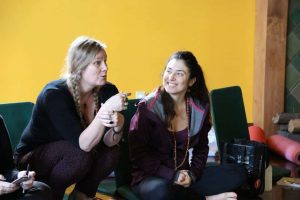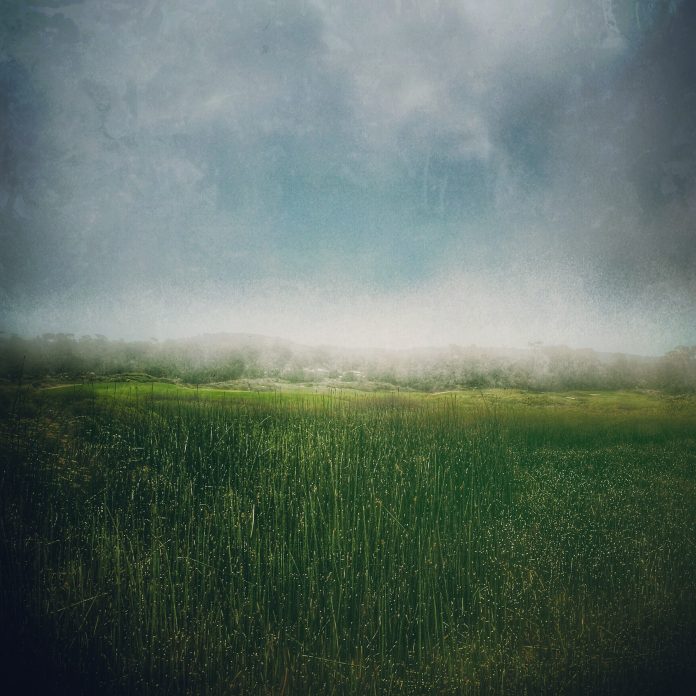There was a family that lived two doors away from us, just over the top of a hill in Silver Lake, in a house that looked like a Beatrix Potter illustration, with a thatched roof and multipaned windows and roses in the tiny front yard. The dad was a doctor, a handsome pediatrician, the wife a full-time mom, blond, tanned and athletic, a swimmer and a tennis player, with happy crinkles at the corners of her eyes; and they had two children, the older a six-year-old boy, the younger a baby girl who was two. My mother and father didn’t know the family well — the parents moved in different social circles and their kids were several years too young to be playmates for me — but my mom used to get up the occasional bridge game with the mom, along with Meryl, who was my friend Jennifer’s mother, and a few other ladies from our neighborhood.
The summer of 1967, the family went off to their annual vacation at Big Bear Lake, and the little girl drowned. The parents, each headed back to the cabin for lunch, took different paths along the edge of the lake. Each thought their daughter was with the other.
Everyone was so sorry about the little girl’s death — this was such a nice family — but as the shock wore off, I became aware of a creeping communal notion that the wrong child had died. No adult ever said so, and certainly not to me, but the feeling was palpable. The little girl was bubbly and sweet, full of personality. The boy was skittish, dorky, and therefore less appealing. At the funeral he was too lightly hugged and then too quickly let go. Later, when the bridge games resumed, I heard someone say, What a shame, now that one was going places, and the ladies all sighed.
Toward the end of that same summer I was invited to spend a three-day weekend with my friend Jennifer and her family at Disneyland, their treat. The outing was to celebrate Jennifer’s twelfth birthday. Reservations had been made at the Disneyland Hotel, and we kids would share our own room, and each morning the monorail would deliver us directly into the park.
Initially, my mother was reluctant to let me go, but after a conversation with Meryl she relented, her consent contingent on their promise to drive me to a Catholic church in Anaheim on Sunday, so that I could attend mass. It meant forgoing an early start to that day’s activities. The requirement must have galled Meryl. She and her husband had so generously included me, and they were spending a ridiculous amount of money, and then to be given conditions? Also, they were atheists.
I never knew what to make of Jennifer’s parents. For one thing, they were affectionate with each other in a way I wasn’t used to. In their car, a bottle-green Jaguar Mark X with tan leather upholstery, Meryl would slide down the bench seat to sit up tight against Davis, and he would drive with his hand on her thigh. The two of them often disappeared into the master bedroom for “naps.” There was no alcohol in their house. No one smoked. No one ever seemed to argue. There were always cookies baking in the oven, and art projects, and musical evenings around the piano. My mother told me once that Meryl got on her nerves; she reminded her of a good friend from when she herself was young, a girl with artful makeup and sculpted curls whose air of eternal perfection so infuriated my mother that one day on the way to school she packed a giant snowball into her fist and mashed it cruelly into her friend’s face.
Well, I was at an age where everyone else’s family seemed better than ours, happier. Other people loved each other more, they had more fun. The parents made indulgences. There were no indulgences at our house and precious little fun. Of course not everything at Jennifer’s was perfect. For instance, she had an older sister who scared the bejesus out of me. This girl was a model Scout, a blue-ribbon gymnast and a piano prodigy, and she regularly forced Jennifer and me into a downstairs closet and made us strip naked so she could scrape our bare buttocks with the serrated edge of a Scotch Tape dispenser until we bled. Maybe, I thought, that was what came of being an atheist. I was ecstatic to learn that she wouldn’t be coming to Disneyland.
We had three whole days to explore the Magic Kingdom. I was used to a noon arrival, Mom dragging me from ride to ride, the time flying by, everything over before I had a chance to feel it. But Davis and Meryl did things differently. They parked themselves on a bench in the shade and gave Jennifer and me money and set us loose. We could ride the Matterhorn bobsleds as often as we could stand to wait in the line. Pirates of the Caribbean, the Submarine Voyage, Autopia, the Jungle Cruise, the Pack Mules, It’s a Small World, Mr. Toad’s Wild Ride. We climbed the Swiss Family Robinson’s Treehouse, took the Mark Twain Riverboat over to Tom Saywer’s Island. Hot and tired, we holed up in a theater on Main Street to watch Great Moments with (an audioanimatronic) Mr. Lincoln, or rode the railroad, or the Mine Train Through Nature’s Wonderland, or the skyway, or the People Mover, or we lazy-susannned through the Carousel of Progress. For each of the three days we stayed at the park until closing, until after the fireworks. And we ate out every meal, hamburgers and French fries, hot dogs with mustard and pickle relish, and for dessert popsicles and ice cream sandwiches. Even having to go to mass on Sunday wasn’t that bad, because when the service was over, Meryl and Davis, who’d waited it out in the car with Jennifer, took us for chocolate-chip pancakes topped with whipped cream, and then we went to a bookstore — they needed reading material for their bench in the shade — and they let me pick out a book. I snatched up a novel called The Defiant Heart, drawn by its cover, a long-haired, violet-eyed teenage beauty in a purple shirtdress. I read the book in the car on the drive home. The heroine was an orphan sent to live with her very strict aunt, and it seemed romantic to me, how alone this girl was in the world, how deeply misunderstood.
When the family dropped me off in front of my house, I couldn’t wait to get inside, couldn’t wait to tell my mother, well, everything.
I ran up the steps, the overnight bag banging against my hip. I was so sunburned my cheekbones ached. In my arms I cradled both The Defiant Heart and a watercolor portrait painted by a genuine Disneyland artist, yet another gift from Davis and Meryl. I was so pleased with this portrait, full of admiration for how the artist had made me look: smooth, rather than frizzy pigtails; an inaccurately upturned nose; a clear light in my hazel eyes.
The front door was open. I ran inside. The house was dark and I called out but no one answered. Then our dog Gyppo was upon me. He seemed weirdly excited, something beyond the joy of reunion. He feinted and returned. Feinted again. Then he took off. I followed him into the darkened living room, where I found my mother curled in an armchair, smoking a cigarette.
I moved to turn on a lamp — I was dying to show her my booty — but “Leave it,” she said. I went to give her a kiss and she gave me a small shove. She was sitting so still in the chair, but I ignored the warning. I babbled on about Disneyland, about Meryl and Davis, about the weekend’s neverending fun. After a couple of minutes, she interrupted.
“Where did you get those shorts?”
I looked down. I’d borrowed a pair of Jennifer’s. She was smaller than me and the shorts were tight.
“I spilled soda all over myself,” I explained.
“And what do you think you’re up to?” she asked.
“I’m — I’m not up to anything.”
“Don’t you argue with me.” My mother’s voice thrummed. She was very angry. She so often was, but there was something extra in her anger that night, something I’d not heard before.
“I should’ve known,” she said. “Sexy. That’s what you think you are.”
“What? No. What do you mean?”
Bitterly, she said, “You know what I mean.”
Disgust. That’s what I heard. I disgusted her. The pain of it hit me in the chest. I was usually a crier, but I didn’t cry then. I couldn’t. I could scarcely breathe.
“Mary Alice!” she hissed.
Mary Alice was my mother’s childhood best friend, she of the artful makeup and sculpted curls, the only daughter of an older couple. The family worked in vaudeville and danced and sang and had a comedy routine. They lived in my mother’s apartment building and she and Mary Alice went to school together and visited back and forth, and stayed up all night, sharing a bed and whispering and giggling. Mom used to tell me that Mary Alice was the smartest person she’d ever known, the most talented, the funniest; but at some point they’d fallen out, and she stopped loving her friend. When I asked her why, all she would say was that something had happened to Mary Alice. And Mary Alice had had to go away. Because Mary Alice was bad.
The summer I was twelve I didn’t understand what that meant, but within a few years I would. Within a few years it would be said of me that something happened. That I had to go away. That I was bad.
But not yet.
“Go to bed now,” my mother said, her voice so low the words cracked coming out of her mouth.
It wasn’t bedtime but I didn’t argue. I didn’t even want to. My mother often accused me of being an itch, of demanding explanations and reassurances, but that night, I couldn’t wait to get away.
In the morning my mother decided that we — she and I — would sweep the roof before breakfast: a pine tree, which towered over our house, dropped needles year round, clogging the gutters and causing leaks, tea-colored stains in the hallway and the living room ceilings that looked like maps of some undiscovered country.
Mom retrieved our splintered old ladder from the basement. Dragged it across the patio and into the narrow walkway between our house and the neighbors’. Because our street was so steep, the distance up to the roof was shortest from there, but the ladder still had to balance precariously atop a retaining wall.
Mom steadied the ladder. She looked at my bare feet. “Goddamnit,” she said, “you have no sense. Go put your sneakers on.”
I returned properly shod, and then climbed. I crawled onto the roof, sat down hard, then scooted around on my butt, working myself closer to the gutter. I leaned over. Blood pounded in my cheeks. Mom fed me first our kitchen broom, then the long, janitor-style sweeper. She climbed up after. There was no one to hold the ladder for her.
She set me to sweeping over the dining room. She took the eaves above the kitchen. We pushed pine needles to the edge and shoved them over, and falling they looked like pitched hay. We got down on our knees to fish the muck from the gutters and tossed that over too. At first I felt the height as a seasicky squirm in the pit of my stomach, but after a while the sensation left me.
Mom worked toward the back of the house while I moved on to the part of the roof that covered the living room. The slant there was steep; the drop to the next house was more than twenty feet. There were fewer pine needles here, but I swept assiduously, working my way along until I balanced precariously at the peak. My chest opened, my head swam. The height was like a fizz in the blood and I felt weirdly buoyant; if wishing made flying possible, I would have been off. Looking out was like seeing into the future. The view was wide, all of the Los Angeles basin, San Gabriel to Catalina Island. Gusts of hot wind — the famed Santa Ana — moved the smog out to sea. Silver Lake Reservoir was blue as a mountain lake, the treed hills on the opposite side felt close enough to touch.
My hair whipped around my head. I was standing too close to the edge. I looked over my shoulder to find my mother watching me. It made me angry, how she leaned on the broom handle, a hand to her eyes. She was angry too. Vibrating in the wind, pulsing, shimmering.
The neighbors who lost their daughter never had another biological child, but four years later they adopted a two-year-old out of foster care, a boy who had been abused. The parents came alive in a way they had not been in ages, full of hope. The boy was damaged, no one was sure what had happened to him, but he’d needed to be rescued and they rescued him and made a new family.
For a few months, while I was a high school senior at a new school, with nowhere to be on Friday and Saturday nights, I babysat this child and his older brother. This was shortly after I’d given up my own son for adoption. By coincidence the neighbors’ boy had the same name. Jamie — James.
I coddled this baby, played with him endlessly, bathed him, and fed him treats. I mostly ignored his older brother, who’d turned into a moody preteen prone to unnerving laughter and public masturbation. He wanted me to play chess with him, but I made excuses. I fixed him dinner and set him up at the dining room table, but he ate alone. He wanted me to read to him but I wouldn’t do it. Instead we watched TV. I pretended there was room for only two on the loveseat. Me and the baby. The older boy sat on the floor and glared at the screen and snuck a hand into the slot in his shorts.
And I thought that maybe it was true that the wrong child had drowned. Well. I’d so recently had my heart crushed, I was so young myself, and so lonely, and I felt so strongly that the world owed me happiness. Blinded by the little boy in my arms, I was unable to see that I was doing another child damage, unaware that there was in me an as yet unrecognized potential for cruelty.
Karen is the author of two novels, All Saints and Border Dogs. Her short fiction has been anthologized in Pushcart Prize XXIX and the Bedford/St. Martin’s Guide to Literature and she is the recipient of fellowships from the National Endowment for the Arts, The MacDowell Colony, and the Colorado Council on the Arts.


To get into your words and stories? Join Jen Pastiloff and best-selling author Lidia Yuknavitch over Labor Day weekend 2015 for their 2nd Writing & The Body Retreat in Ojai, California following their last one, which sold out in 48 hours. You do NOT have to be a writer or a yogi.
“So I’ve finally figured out how to describe Jen Pastiloff’s Writing and the Body yoga retreat with Lidia Yuknavitch. It’s story-letting, like blood-letting but more medically accurate: Bleed out the stories that hold you down, get held in the telling by a roomful of amazing women whose stories gut you, guide you. Move them through your body with poses, music, Jen’s booming voice, Lidia’s literary I’m-not-sorry. Write renewed, truthful. Float-stumble home. Keep writing.” ~ Pema Rocker, attendee of Writing & The Body Feb 2015

Featured image courtesy of Tiffany Lucero.


[…] new essay, “The Defiant Heart,” is up at Jen Pastiloff’s website The […]
Wow, just wow…
This is just beautiful…
Brave and beautiful work!